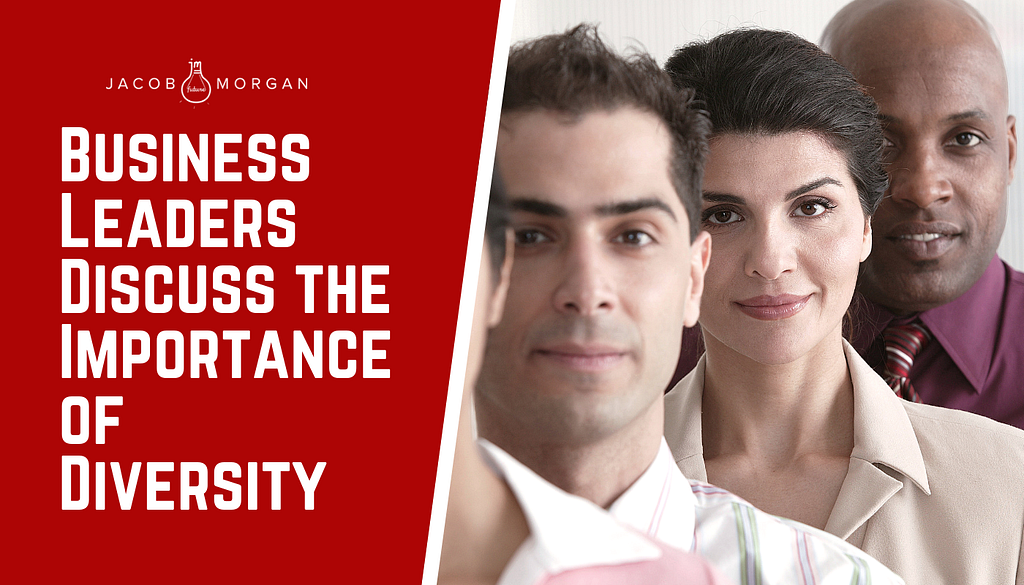Business Leaders Discuss The Importance Of Diversity

Diversity is definitely a buzzword in today's business world. But more than just a passing trend, diversity should be a core value of every business. Each week I talk with business experts on my podcast The Future of Work Podcast. I enjoy hearing what they have to say about important topics, and diversity is no exception. Here are a few things my recent guests have shared about why diversity is so important and the challenges that organizations face as they try to become more inclusive.
Anka Wittenberg is the SVP and Chief Diversity & Inclusion Officer at SAP and an advocate for workplace diversity. As a mother of three, Anka is a walking example of diversity, especially when one of the characteristics that makes her unique -- being a mother -- was what made it difficult for her to get an interview with many large firms in Germany. Anka believes the uniqueness of a workforce emerges when organizations include people from all walks of life. Corporate cultures are changing to include more diverse thoughts. Many employers are focusing on a more holistic picture and are seeing the business impact of greater innovation and customer satisfaction as they embrace a more diverse workforce.
Churchill Franklin is the CEO of Acadian Asset Management, and John Chisholm is the company's Chief Investment Officer. Their company culture embraces listening to both clients and colleagues to become a leader in the investment industry. In order to do that, Churchill and his team have embraced cognitive diversity. Employees come from a variety of cultures, backgrounds, and educational systems. The more perspectives around the table, the better for the business and clients. When employees have a variety of personalities and perspectives, they can bring new points of view to discussions.
Churchill and John are quick to point to research that shows that diverse groups perform better than homogenous groups. This is true at Acadian as diverse teams are tasked with problem solving -- each employee may have a different approach, but together the team can thoroughly examine the problem from all sides. Diversity is more than just a person's race or religion; it can also include their thought process and how they approach challenges. Churchill and John admit that it is often easier to hire and work with people who think alike, but doing so can pigeonhole a company into one approach instead of opening ideas for innovation.
Karyn Twaronite is the Global Diversity and Inclusiveness Officer at EY. With employees in more than 150 countries, it can be a challenge to bring together people with diverse backgrounds to create high-performing teams. Karyn believes diversity and inclusiveness impact client relations, service, marketing, HR, and much more. Karyn and her team work to ensure EY embraces diversity beyond just gender and nationality but also with different educational levels and areas of expertise.
Karyn thinks of diversity as three Cs: compliance, character, and commerce. It used to be that companies were only focused on the compliance of diversity and filling quotas of certain types of employees. However, that doesn't show the entire picture. Character showcases how engrained diversity is into a company's culture. Commerce is how diversity impacts a business's performance. Each C is important, but together they create the full view of diversity. Embracing and highlighting diversity adds to the employee experience because employees want to feel they can use their unique strengths and skills at work.
Celeste Warren, Vice President of Human Resources and Global Diversity and Inclusion, Center of Excellence at Merck, says it is important for organizations to create a culture that allows employees to be their true selves at work. A challenge of diversity and inclusion is making sure people aren't marginalized and that their ideas are considered and added to an organization's success. Merck brings group leaders together each month to discuss the various diversity challenges within the company and to represent different types of employees.
Diversity is definitely a powerful way to improve the employee experience. By embracing all types of employees and customers, companies can find unique solutions, diversify their offerings, and move towards the future as leaders.
Learn the proven & powerful concepts in today's most effective organizations with my free training series on Employee Experience here.
Business Leaders Discuss The Importance Of Diversity was originally published in Jacob Morgan on Medium, where people are continuing the conversation by highlighting and responding to this story.









